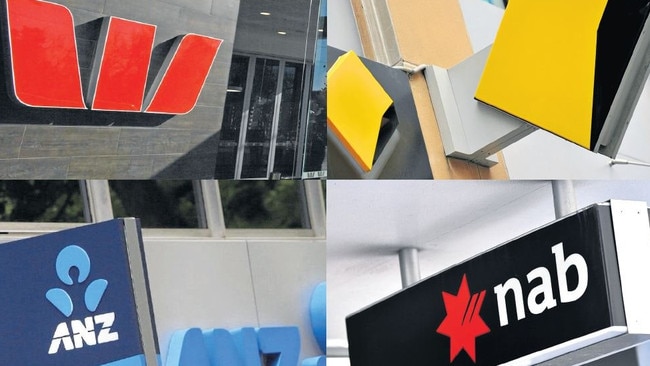Loyal borrowers lose out as banks race to sign new customers
Banks have been hitting mortgage customers with the full force of multiple rate hikes, while offering discounts to sign up new customers.

Business
Don't miss out on the headlines from Business. Followed categories will be added to My News.
Banks have been hitting mortgage customers with the full force of multiple rate hikes, while offering discounts to sign up new customers. The so-called “loyalty tax” – the price borrowers pay for being loyal to their bank while new customers are offered a sweeter deal – comes as lenders face a collapse in demand for new borrowing.
Interest rates have hit their highest level in more than seven years and they are on track to increase further by December as the Reserve Bank attempts to stamp out inflation. The discounted rate for new loans reflects a furious battle between banks to keep their existing customers as billions of dollars in cheap fixed-rate home loans start to roll off and reset at a higher rate.
Figures supplied by lending tracker RateCity show that while customers have seen their existing variable rate mortgages rise by 2.25 percentage points since the RBA began hiking rates in May, nearly 30 lenders have cut the rate they offer to new customers.
The average lowest variable rate offered by big four banks to new customers has risen by 1.99 percentage points from before the May rate rise cycle, showing the extent of the loyalty tax.
Westpac has the lowest variable mortgage rate on offer for new customers, making it the only major bank to offer a loan below 4 per cent, RateCity figures show. Westpac’s is a teaser rate of 3.99 per cent, and while it moves with the cash rate, the loan will revert to a higher rate in two years. That’s a discount of as much as 0.35 percentage points between Westpac’s new loans and its backbook, suggesting the lender is making a big play for borrowers coming off fixed-rate loans.
Both Commonwealth Bank and ANZ are offering new mortgage rates at 4.19 per cent (a 0.25 percentage point discount) while NAB is offering 4.24 per cent (a 0.2 percentage point discount), the RateCity figures show.
Macquarie Bank – which in recent years has had some of the sharpest pricing – is pitching variable mortgages to new customers at 4.09 per cent, a 0.3 percentage point discount.
Australians rushed ultra-cheap fixed-rate loans during the Covid pandemic, with as much as 40 per cent of new mortgages locked in, mostly between one and three years. These loans are now starting to mature and most customers are expected to switch to a variable rate which will be substantially higher than what they have been paying.
Barrenjoey analyst Jon Mott calculates there are some $500bn of fixed rate mortgages set to mature by the end of next year, showing just what is on the line for possible market share gains and losses.
“Some players are incentivised to price very competitively,” Mott says.
Big bank bosses including CBA and ANZ have said in recent weeks that despite rates moving higher there have been no signs of mortgage stress in their lending books. Indeed ANZ chief executive Shayne Elliott said there was “resilience” in the economy with conditions still good, while households were sitting on high levels of savings.
Demand for new home loans fell 8 per cent in July and is down 11.3 per cent on the year, latest ABS figures show.
The RBA has toughened up its rhetoric around bringing inflation down, with economists now pencilling in another 50 basis point rate rise in October. Money markets are tipping the cash rates could peak at 4 per cent next year, from 2.35 per cent currently.
–
Cyber shock for Optus
Optus boss Kelly Bayer Rosmarin is facing the biggest test of her career as the telco major admits to being hit with one of Australia’s largest cyber attacks.
It is likely Optus is now being held hostage to a ransomware attack and could be forced to pay up to reclaim the personal data being held on millions of Australians. Failure to do so could see the threat of the data sold onto the dark web. It is likely we will never know if they pay or not as companies are loathe to discuss these details.
The attack is a wake-up call for all businesses with their cyber defences only as strong as their weakest link.

Cyber attacks have increased sharply through the Covid-19 pandemic, particularly with security processes being bypassed as more people have been working from home or on unsecure internet networks.
Bayer Rosmarin knows how critical data protection is. The former consultant rose through the ranks of Commonwealth Bank to become its head of institutional banking. She was appointed to the top job at Optus in April 2020.
Banks come under attack almost daily and boards of Australia’s biggest companies have consistently nominated cyber attack as their biggest operational risk. Regulators have been putting pressure on bank boards and management to have detailed cyber defence plans in place.
As a large organisation with millions of customers, Optus should have a detailed incident response playbook, including defining a process around when, how and under what conditions to pay a ransom to secure the data.
Personal details in the Optus data breach hitting up to 9 million people include valuable information linking customer names, date of birth and phone numbers. More worrying for some customers the breach of high level data includes driver’s licence and passport details.
Initially Optus will be seeking to get across the extent of the breach, but then it needs to answer the question of how this could happen and what processes were in place around data on former customers that was also stolen in the attack.

That so much high level data was held in one place is of concern with the telco hopefully having multiple layers of security and isolating the layers of sensitive data. Optus says no payment or password details were stolen.
Questions around vulnerability to cyber attacks have broader implications for Optus, which is owned by regional telecom giant Singapore Telcom. Optus operates the legacy AUSSAT business and now operates a fleet of five Australian satellites, with some of these handling sensitive communications.
Cyber attacks can be more than data breaches, with Nine Entertainment hit by a massive attack last year that disrupted its computer systems and forced it to relocate some of its TV broadcasting operations.
Attacks have become more sophisticated in recent years, using phishing email campaigns targeting employees to embed a backdoor code or even going after suppliers that do business with the target company.
There is a reportable cyber attack in Australia every eight minutes according to the government-backed Australian Cyber Security Centre. Self-reported losses from cybercrime have totalled more than $33bn, ACSC figures show.
johnstone@theaustralian.com.au
More Coverage
Originally published as Loyal borrowers lose out as banks race to sign new customers




